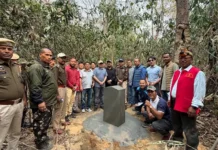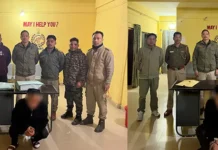Monday Musing
[ Tongam Rina ]
Demeaning women by people in positions of power is not only a reflection of their upbringing, personality, or lack thereof; it also reveals a great deal about the general behaviour and character of society.
Using derogatory words to describe women is not a new trend – from commodification to sexual objectification – but the way such language has been weaponised to attack women in full public view is deeply concerning. Phrases and words that humiliate women are casually thrown around in public discourse with absolutely no fear or hesitation.
If a woman belongs to a minority community, like the Muslim community, she is subjected to various forms of humiliation – ranging from attacks on identity to food habits and religious and cultural stereotypes – which she must confront on a daily basis. Muslims, irrespective of gender, are abused on a regular basis, but outspoken Muslim women who will not tolerate any nonsense face it every day. Journalists like Arfa Khanum Sherwani and Rana Ayyub, for instance, are threatened and abused relentlessly on social media. While no woman or girl is truly safe online, very little is being done to ensure their digital safety.
But this behaviour isn’t restricted to the internet. Indian men, particularly those from mainland India who follow the right-wing Hindutva ideology – and patriarchal men from Northeast India – seem to be in a constant state of outrage against anything or anyone they disagree with. They troll and abuse incessantly and need no excuse to lash out.
Narendra Modi has previously referred to Sonia Gandhi as a “Jersey cow” and Congress leader Rahul Gandhi as a “hybrid calf.” Does such language befit a prime minister/chief minister – even one with a certain reputation?
If you thought that right-wing BJP and Hindutva supporters would limit their abuse to the Gandhis or Muslims, you’d be mistaken. They lash out at anyone who disagrees with them. Foreign Secretary Vikram Misri had to scramble to protect his daughter from online abuse after the announcement of a ceasefire with Pakistan.
Himanshi Narwal, wife of Lieutenant Vinay Narwal – who was killed in the recent terror attack in Pahalgam – was trolled viciously by right-wing Hindutva supporters after she urged people not to target Muslims and Kashmiris in the wake of the 22 April attack, which killed 26 people, mostly tourists. She was not even given time to mourn.
The wives and children of Indian cricketers are relentlessly trolled and abused whenever the team loses a match. Their children are even threatened with sexual assault.
Closer to home, Assam Chief Minister Himanta Biswa Sarma used derogatory language to describe women employees who were hired during the Congress’ rule in the state. He has consistently targeted Congress leader Gaurav Gogoi and his wife, who is not Indian by birth. Her impressive resume has been used to discredit her. With elections looming, Sarma – known for playing to the gallery – is expected to ramp up such rhetoric to distract from real issues threatening Assam.
In Arunachal Pradesh, the Tagin Cultural Society’s women’s wing and the Arunachal Pradesh Women’s Welfare Society demanded a public apology from an IAS officer after his troubling and inappropriate comments about women from a particular ethnic group during an event in Dumporijo.
“The statement he made trivialised the identity of women and projected them as incentives or commodities,” said the TCS women’s wing in a statement. A repeat offender, he had previously been warned by the APWWS to behave and mend his ways. Yet, much of his unacceptable behaviour is laughed off – because men’s misconduct is easily forgotten, and often celebrated, more so if you are an IAS officer.
Kashmiris are abused for being Kashmiris. Minorities are abused for being minorities. Christians are abused for being Christians. Women are abused for not meeting society’s set standards.
Caste-based slurs are normalised. For those of us from the Northeast, particularly Arunachal and other tribal areas, we might not be very familiar with casteism and do not fully understand how demeaning it is – and how it practically decides lives in mainland India.
Remember the word ‘chapri’, which is often used to mock people? Please check its etymological origins – it is a casteist slur.
People from the Northeast are regularly called ‘Chinese’ and ‘small-eyed’, because these are the stereotypical terms used to describe people from the region. There is nothing wrong with being Chinese or having small eyes – yet many Indians who do not conform to the dominant image of ‘Indianness’ are forced to live in fear. They are targeted for their appearance, behaviour, or dietary choices, and often face the threat of violence or even death in mainland India.
Even the Prime Minister was recently heard saying that idols of Hindu God Ganesh “also comes from abroad – that too with small eyes” while referring to China, leaving even his own party members scratching their heads in disbelief.
Hindu right-wingers – who are deeply patriarchal, jingoistic, and perpetually insecure about their identity and religion – are abusive, irrespective of gender. Unfortunately for the women who proudly identify as right-wingers and supporters of the BJP, even they are not safe from online violence. It’s a complex world.
Patriarchy and violence go hand in hand. If allowed to grow unchecked, the consequences will be even more dangerous. Often, online trolling leads to offline threats. While disparaging comments are not new, the way such behaviour has been normalised is truly alarming.


